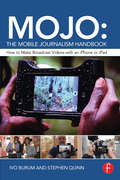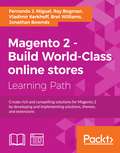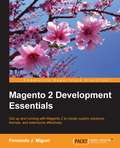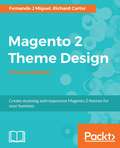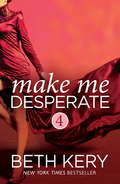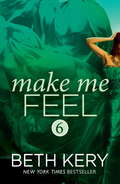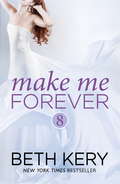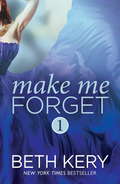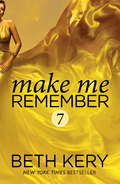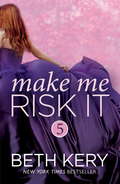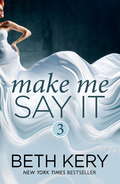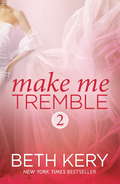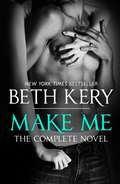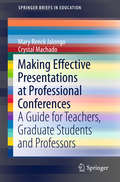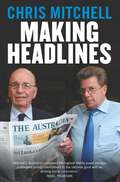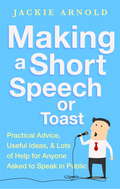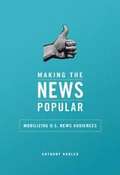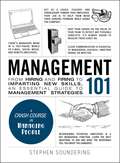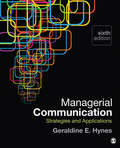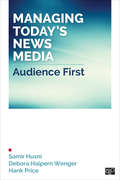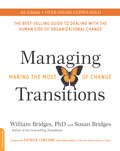- Table View
- List View
MOJO: How to Make Broadcast Videos with an iPhone or iPad
by Stephen Quinn Ivo BurumMOJO: The Mobile Journalism Handbook is the first book devoted specifically to training citizens, journalism students and media professionals to produce professional-quality videos with only a mobile device. As journalism becomes increasingly competitive, students and emerging professionals need a broader skillset to make themselves more employable, whether as mainstream or entrepreneurial journalists. This book by Dr. Ivo Burum and Dr. Stephen Quinn, world experts in mobile journalism, provides comprehensive coverage of all the skills and practices needed to be a mobile journalist. Key features: Burum and Quinn underline the importance of story and storytelling, the crucial context journalists always need to keep in mind. Other books and tutorials merely offer step-by-step guidance to mobile technology and apps. The book synthesizes the knowledge and more than 70 years of combined expertise of two of the world’s leading mobile journalism practitioners, offering sage advice and tips from people who have trained mojos in more than 20 countries. Companion Website: How-to videos on the companion website offer powerful ways for learners to absorb the content easily, walking them through the key mojo components of research, shooting, scripting, voice-over, editing and post-production. www.routledge.com/cw/burum Ivo Burum is an award-winning writer, director and television executive producer. He has more than 30 years’ experience working across genres including frontline international current affairs. A pioneer in UGS creation, Dr. Burum lectures in multimedia journalism. This is his second book about mojo. He runs Burum Media, a mojo and web TV consultancy that provides training for journalists, educators and remote communities internationally. Stephen Quinn was a journalist for 20 years before he became a university professor in 1996. Dr. Quinn taught journalism in five countries until he returned to journalism in 2011 in Hong Kong. His UK-based company MOJO Media Insights trains mobile journalists around the world. This is his twenty-first print book. He has also produced 5 iBooks. He co-writes a weekly column syndicated to seven countries.
Magento 2 - Build World-Class online stores
by Bret Williams Fernando J. Miguel Ray Bogman Vladimir Kerkhoff Jonathan BowndsCreate rich and compelling solutions for Magento 2 by developing and implementing solutions, themes, and extensions About This Book • Be proficient in the main functionalities, resources, and system structure of Magento 2 • Get to grips with this practical and hands-on guide to raise your web development skills to the next level • Packed with several advanced recipes, not just to manage your online store, but to extend and design it as well Who This Book Is For The ideal target audience for this course could be anyone who wants to mould their skills in building amazing e-commerce websites using Magento. We begin right from getting you started with Magento to becoming an expert at building your own online stores with it. What You Will Learn • Install and set up the Magento Ecosystem • Carry out performance adjustments to speed up your Magento system • Transfer your Magento 1 database to Magento 2 using the Magento 2 system tools • Build a Magento 2 multi-store by creating a root catalog, subdirectories, and products • Design custom themes within the Magento 2 framework • Create extensions using Magento 2 • Discover what makes Magento 2 different and more powerful In Detail Magento is the leading e-commerce software trusted by world`s leading organizations. Used by thousands of merchants for their transactions worth billions, it provides the flexibility to customize the content and functionality of your website. Our Magento Course will help you gain knowledge and skills that are required to design & develop world class online stores. Magento 2 Development Essentials - This book begins by setting up Magento 2 before gradually moving onto setting the basic options of the Sell System. You will learn Search Engine Optimization aspects, create design and customize theme layout, and adjust the Magento System to achieve great performance. Magento 2 Cookbook – This book is divided into several recipes, which show you which steps to take to complete a specific action. It will cover configuring your categories and products, performance tuning, creating a theme, developing a module etc. At the end of this book, you will gain the knowledge to start building a success website. Mastering Magento 2 - This is a comprehensive guide to using the all new features and interface of Magento 2 to build, extend, and design online stores. This book is your roadmap to managing your Magento store which teaches advanced and successful techniques. Focusing on Magento's Community version, this book offers you advanced guidance on managing, optimizing, and extending your store while taking advantage of the new features of Magento 2. This Learning Path combines some of the best that Packt has to offer in one complete, curated package. It includes content from the following Packt products • Magento 2 Development Essentials by Fernando J. Miguel • Magento 2 Cookbook by Ray Bogman and Vladimir Kerkhoff • Mastering Magento 2 by Bret Williams and Jonathan Bownds Style and approach This course begins by setting up Magento 2 before gradually moving on to setting the basic options of the Sell System. You will master Search Engine Optimization aspects, create designs and customize theme layouts, develop new extensions, and adjust the Magento System to achieve great performance. The book covers everything from creating and managing multiple stores to fine-tuning Magento for speed and performance.
Magento 2 Development Essentials
by Fernando J. MiguelGet up and running with Magento 2 to create custom solutions, themes, and extensions effectively About This Book * Create unique solutions for Magento 2 by developing and implementing solutions, themes, and extensions * Be proficient in the main functionalities, resources, and system structure of Magento 2 * Get to grips with this practical and hands-on guide to raise your web development skills to the next level Who This Book Is For If you are a PHP developer who wants to improve your skills in e-commerce development by creating themes and extensions for Magento 2, then this book is for you. What You Will Learn * Install and set up the Magento Ecosystem * Choose the best options for Magento's Sell System features * Work with Search Engine Optimization in Magento * Create and customize themes for Magento * Develop extensions for new Magento functionalities * Package extensions to publish in the Magento Connect network * Create Magento solutions for mobile devices * Carry out performance adjustments to speed up your Magento system In Detail Magento is the e-commerce software and platform trusted by the world's leading brands. Used by thousands of merchants for their transactions worth billions, it provides the flexibility to customize the content and functionality of your website. By strengthening your fundamentals in Magento development, you can develop the best solutions and take advantage of the growing market. This fast-paced tutorial will provide you with skills you need to successfully create themes, extensions, and solutions to Magento 2 projects. This book begins by setting up Magento 2 before gradually moving onto setting the basic options of the Sell System. You will take advantage of Search Engine Optimization aspects, create design and customize theme layout, develop new extensions, and adjust the Magento System to achieve great performance. By sequentially working through the steps in each chapter, you will quickly explore all the features of Magento 2 to create a great solution. With ample examples and a practical approach, this book will ensure your success with this astonishing e-commerce management system. Style and approach This book would be a fast-paced tutorial guide that uses hands-on examples to developing new solutions for Magento e-commerce system. Each topic is explained sequentially in the process of creating a Magento solution, along with detailed explanations of the basic and advanced features of Magento 2.
Magento 2 Theme Design - Second Edition
by Richard Carter Fernando J MiguelCreate stunning and responsive Magento 2 themes for your business About This Book * Realize the full potential of theme design in Magento 2 * Design attractive themes for your e-commerce store to make them stand out amongst the crowd * Practical skills and examples ensure you can take what you've learnt to your own projects - limited only by your own creativity! Who This Book Is For This book is for web designers and developers with existing knowledge of CSS, HTML, and XML who wish to create themes for Magento 2. Existing Magento 1.x theme designers who now want to develop themes for Magento 2 will also find this book useful. What You Will Learn * Implement a local development Magento environment * Understand the workings of the Magento theme structure * Edit an existing Magento theme to satisfy your business needs * Create print strategies for the Magento 2.0 theme * Generate specific blocks to improve the Magento 2.0 theme * Explore specific Magento programming Methods to improve the Magento 2.0 theme * Customize the Magento 2.0 admin panel to create a new Magento 2.0 admin theme * Build a Twitter module for Magento 2.0 and integrate Magento 2.0 with social bookmarking In Detail Magento is the e-commerce software and platform trusted by the world's leading brands. Using Magento's powerful theming engine, you can control the look, content, and functionality, and easily launch a flexible e-commerce website. However, because of its powerful features, developing Magento themes is easier said than done. This book aims to leverage the enhancements to theme designing in Magento 2 to the fullest. It will show you how to gear up the performance of your e-commerce website. We begin by introducing Magento 2 and its features along with implementing a local development Magento environment. We then move on to discuss the concepts of the Magento theme structure such as templates, inheritance, customization, and override. Further on, we explore the Magento UI Library, which is a new feature available in Magento 2.0. We will create a new Magento 2.0 theme named MyCake Store using Magento Bootstrap from Maven E-commerce and also create print strategies for the Magento 2.0 theme. We will also create and customize a new theme proposal for the Magento admin panel. At the end, we will integrate Magento 2.0 to Twitter and integrate it with social bookmarking and finally deploy our new Magento 2.0 theme. Style and approach This is a step-by-step guide to customizing the look and feel of your online store by creating stunning and responsive themes from scratch. In addition to creating new themes, the book will also offer guidance on customizing existing themes.
Make Me Desperate (Make Me)
by Beth KeryFrom the New York Times bestselling author of Because You Are Mine and The Affair, comes Make Me - a tantalizing serial novel about hidden pasts, dangerous obsessions, and uncontrollable passion, perfect for fans of E. L. James, Sylvia Day, Jodi Ellen Malpas and J. Kenner. Jacob's addiction to Harper is putting his life's work at risk, but he can't deny himself the pleasure he feels when he's with her. Even when her seeming refusal to acknowledge their past connection makes him doubt her true intentions, he finds himself pushing their affair further, insisting Harper submit to their attraction, even in the most compromising of circumstances.As their encounters become even more lavish, daring, and intimate, Harper aches to break down the walls around Jacob's heart. But she fears his secrets conceal a dark side she's not ready to face. When he suggests a weekend in San Francisco together, she accepts despite her doubts about getting involved with such a guarded, powerful man. There's something about him that keeps her coming back for more. He claims he's obsessed, but she is every bit as compelled...Don't miss the next instalment, Make Me Risk It...Includes a bonus excerpt of Beth Kery's Because You Are Mine.Discover the other captivating titles by Beth Kery: The Affair, the One Night of Passion series, and her bestselling erotically charged series which began with Because You Are Mine.
Make Me Feel (Make Me)
by Beth KeryFrom the New York Times bestselling author of Because You Are Mine and The Affair, comes Make Me - a tantalizing serial novel about hidden pasts, dangerous obsessions, and uncontrollable passion, perfect for fans of E. L. James, Sylvia Day, Jodi Ellen Malpas and J. Kenner. Haunted by the prospect of possessing Harper whenever he can, Jacob deepens his risk, indulging in a passionate escape with her at his Sea Cliff mansion. In their moments of intimacy, there are times when Jacob could swear Harper remembers their shared past, making him wonder if she's purposefully misleading him about forgetting Jake Tharp. But despite his suspicions and increasing worries for her well-being if she does remember that traumatic time, he finds himself falling harder for the woman who has reignited his most savage desires, and his most tender feelings...Harper can't help feeling uneasy even though Jacob has begun to slowly open up to her about his past and his relationship with the beautiful Regina Morrow. There's a mystery to her lover that she can't comprehend, even as she draws alarmingly close to him with each second she spends in his challenging, intoxicating presence. As their days of volatile passion and pleasure in San Francisco draw to a close, she realizes how much she longs for this enigmatic man. Despite her fears about his secretiveness, when he reveals he wants her to stay with him indefinitely in his Lake Tahoe home, she realizes just how strong her need for him has grown...Don't miss the next instalment, Make Me Remember...Includes a bonus excerpt of Beth Kery's Since I Saw You.Discover the other captivating titles by Beth Kery: The Affair, the One Night of Passion series, and her bestselling erotically charged series which began with Because You Are Mine.
Make Me Forever (Make Me)
by Beth KeryFrom the New York Times bestselling author of Because You Are Mine and The Affair, comes Make Me - a tantalizing serial novel about hidden pasts, dangerous obsessions, and uncontrollable passion, perfect for fans of E. L. James, Sylvia Day, Jodi Ellen Malpas and J. Kenner. Unable to hide from Harper any longer, Jacob reveals his painful past, finally acknowledging his long-hidden connection to her. Afraid the truth will drive her away forever, he's surprised when Harper exposes startling facts about her own past.Harper is angry at Jacob for robbing her of someone she'd loved and burying a part of himself she'd forever cherish. Still, when he faces a devastating loss, Harper races to his side. Strengthened by Harper's love, Jacob finally fully bares his soul and reveals everything he has kept hidden. But if they are to have a future together, he will need to release all of his shame - and embrace a happiness they both desperately deserve.Includes a bonus excerpt of Beth Kery's Looking Inside.Discover the other captivating titles by Beth Kery: The Affair, the One Night of Passion series, and her bestselling erotically charged series which began with Because You Are Mine.
Make Me Forget (Make Me)
by Beth KeryFrom the New York Times bestselling author of Because You Are Mine and The Affair, comes Make Me - a tantalizing serial novel about hidden pasts, dangerous obsessions, and uncontrollable passion, perfect for fans of E. L. James, Sylvia Day, Jodi Ellen Malpas and J. Kenner. Harper McFadden has made her name as an investigative journalist by being both compassionate and fearless. After tragedy strikes her family, she moves to the shores of Lake Tahoe to find some peace. But when mysterious software mogul Jacob Latimer comes into her life, her thoughts turn from her own healing to an urgent need to get closer to him...Jacob Latimer is the definition of a self-made man. The software entrepreneur built his corporation from nothing, but rumors abound about the shadiness of his rise to power and no one knows what secrets lurk in his past. Harper is the last person he should let into his life. As an investigative journalist, she's the one person who could expose his hidden origins. But Jacob knows things about Harper's past that make him irresistibly drawn to her. He wants nothing more than to make her his - and Jacob is a man who always gets what he wants...Don't miss the next instalment, Make Me Tremble...Includes a bonus excerpt of Beth Kery's Glimmer.Discover the other captivating titles by Beth Kery: The Affair, the One Night of Passion series, and her bestselling erotically charged series which began with Because You Are Mine.
Make Me Remember (Make Me)
by Beth KeryFrom the New York Times bestselling author of Because You Are Mine and The Affair, comes Make Me - a tantalizing serial novel about hidden pasts, dangerous obsessions, and uncontrollable passion, perfect for fans of E. L. James, Sylvia Day, Jodi Ellen Malpas and J. Kenner. During sun-drenched, passionate days spent on Jacob's yacht, Harper and Jacob fall deeper in love, taking risks not only with their bodies but their hearts. The only thing standing between Jacob and pure bliss is the suspicion that Harper's memories are returning. If they do, she may never see him the same way again - or let him keep her safe from the horror that she faced as a young girl...The sense of security and trust Harper feels with Jacob has her finally abandoning herself to sensual decadence along with the truth that she's hopelessly in love with this dark, daring man. With her submission to her feelings, sad memories and dreams begin to rise to the surface of her consciousness-and hers isn't the only past being unburied. When one of her reporters reveals a startling revelation about Jacob's history, their shared experiences crash together in a way that will change her forever.Don't miss the jaw-dropping conclusion in Make Me Forever...Includes a bonus excerpt of Beth Kery's Wicked Burn.Discover the other captivating titles by Beth Kery: The Affair, the One Night of Passion series, and her bestselling erotically charged series which began with Because You Are Mine.
Make Me Risk It (Make Me)
by Beth KeryFrom the New York Times bestselling author of Because You Are Mine and The Affair, comes Make Me - a tantalizing serial novel about hidden pasts, dangerous obsessions, and uncontrollable passion, perfect for fans of E. L. James, Sylvia Day, Jodi Ellen Malpas and J. Kenner. Harper has had more than her fair share of bad luck with men. Although Jacob treats her royally and she can't resist his challenging sexual demands, his secretive nature makes her worry that he's just like all the rest. When a romantic trip to San Francisco gives her a glimpse into his past, Harper's distrust of powerful men kicks into overdrive. Between his questionable business activities, which Harper's paper wants to expose, and his secretive relationship with another woman, Harper wonders if his intentions are truly noble...Unable to get her out of his head, Jacob takes the risk of exposing part of his painful past to Harper. Even though his fascination with her could be his downfall, Jacob willing to do anything to bind her even closer to him...Don't miss the next instalment, Make Me Feel...Includes a bonus excerpt of Beth Kery's When I'm With You.Discover the other captivating titles by Beth Kery: The Affair, the One Night of Passion series, and her bestselling erotically charged series which began with Because You Are Mine.
Make Me Say It (Make Me)
by Beth KeryFrom the New York Times bestselling author of Because You Are Mine and The Affair, comes Make Me - a tantalizing serial novel about hidden pasts, dangerous obsessions, and uncontrollable passion, perfect for fans of E. L. James, Sylvia Day, Jodi Ellen Malpas and J. Kenner. Even as Jacob offers Harper a life of luxury and indulgence that thrills all her senses, she grows wary of this powerful man and his unquenchable desires. In their most intimate moments, Harper can't help but submit to his seductive demands. But the man outside the bedroom, whose early business dealings carry an air of questionable origins, who refuses to share even the smallest detail about his past, is an entirely different story...Jacob worries that, deep inside, Harper must recognize who he really is - the boy he was before he became a powerful, billionaire mogul. As much as he craves acknowledgment of their shared past, he dreads she might call him out as a fraud and leave his life forever...Don't miss the next instalment, Make Me Desperate...Includes a bonus excerpt of Beth Kery's The Affair.Discover the other captivating titles by Beth Kery: The Affair, the One Night of Passion series, and her bestselling erotically charged series which began with Because You Are Mine.
Make Me Tremble (Make Me)
by Beth KeryFrom the New York Times bestselling author of Because You Are Mine and The Affair, comes Make Me - a tantalizing serial novel about hidden pasts, dangerous obsessions, and uncontrollable passion, perfect for fans of E. L. James, Sylvia Day, Jodi Ellen Malpas and J. Kenner. When Jacob Latimer ran into Harper McFadden on the beach, she thought it was the first time their paths had crossed. Only Jacob knows that his murky history connects with hers in ways she couldn't imagine - ways that make their relationship dangerous. He should let her go. But now that he's felt her in his arms, he worries that he'll never be able to forsake her... Harper has never been this attracted to anyone before - nor has she ever been so intimidated. Jacob can go from aloof and mysterious to total mastery of her mind and body in a second flat. In the glamorous setting of his luxurious yacht, he finally stakes his claim. And he won't stop until he has every inch of her under his delicious control...Don't miss the next instalment, Make Me Say It...Includes a bonus excerpt of Beth Kery's Glow.Discover the other captivating titles by Beth Kery: The Affair, the One Night of Passion series, and her bestselling erotically charged series which began with Because You Are Mine.
Make Me: Complete Novel (Make Me)
by Beth KeryFor fans of E. L. James, Sylvia Day, Jodi Ellen Malpas, J. Kenner and Maya Banks. From the New York Times bestselling author of The Affair and the Because You Are Mine series, Make Me explores hidden pasts, dangerous obsessions, and uncontrollable passion... Harper McFadden established herself as an investigative journalist by being both compassionate and fearless. After tragedy strikes her family, she moves to the shores of Lake Tahoe to find some peace. But when mysterious software mogul Jacob Latimer enters her life, her thoughts turn from her own healing to an insatiable desire to get closer to him...No one knows what secrets lurk in the past of Jacob Latimer. He built his corporation from nothing, but rumors abound about his mysterious rise to power. Harper is the last person he should let into his life. She could expose the truth about his origins. But Jacob knows things about Harper's past that draw him in. He wants nothing more than to make her his - and Jacob is a man who always gets what he wants...For more electrifying romance, don't miss the other captivating titles by Beth Kery, The Affair, Glimmer, Glow, the One Night of Passion series, and her bestselling erotically charged series which began with Because You Are Mine.
Making Effective Presentations at Professional Conferences
by Mary Renck Jalongo Crystal MachadoThis work prepares teachers, college students, and higher education faculty to conduct various types of presentations, including workshops and teacher inservice trainings; poster sessions; panel discussions; roundtables; research forums; and technology-supported presentations. Making effective presentations to fellow professionals at conferences is an important contribution for educators at all levels, from basic through higher education. The book takes the approach of a "paper mentor" that guides the reader through the use of templates, specific examples, and a wide range of on-line resources.
Making Headlines
by Chris MitchellAs editor-in-chief of The Australian, Chris Mitchell ran the largest stable of journalists with the largest editorial budget in the country for more than twelve years. This entertaining and deeply revealing book offers readers riveting insights into the quirks and foibles of some of the most powerful politicians and media executives this country has produced. A controversial figure throughout his quarter of a century as a daily editor, Chris Mitchell still maintains close regular contact with past prime ministers, editors and media CEOs. Making Headlines highlights the judgements and thinking that govern daily newspaper journalism at the highest level and the battles fought to publish tough stories about the rich and the powerful, the disenfranchised and the powerless. Making Headlines is compulsory reading for citizens who care, the political class inside the beltway and beyond, and wannabe journalists in search of a job.
Making a Short Speech or Toast: Practical advice, useful ideas and lots of help for anyone asked to speak in public
by Jackie ArnoldMost people are called upon to make a speech or toast at some point in their lives. This book will help the inexperienced speaker to stand up with confidence, and deliver a really effective speech or toast that is appropriate for the occasion. It also contains a variety of toasts and quotes to help those with more experience in public speaking.There are guidelines on how to prepare and deliver a mini speech, including tips on introducing humour and how to avoid embarrassing your audience with inappropriate material. A special section includes interesting quotes and toasts to insert into a wedding speech, whether it's by the best man or woman, bridegroom or father of the bride. A workbook section helps the reader with ideas for appropriate beginnings and endings to speeches. There is even an A-Z of sample toasts for all occasions including anniversaries, achievements, and business occasions; and for a range of subjects such as love, life, and friendship.
Making a Short Speech or Toast: Practical advice, useful ideas and lots of help for anyone asked to speak in public
by Jackie ArnoldMost people are called upon to make a speech or toast at some point in their lives. This book will help the inexperienced speaker to stand up with confidence, and deliver a really effective speech or toast that is appropriate for the occasion. It also contains a variety of toasts and quotes to help those with more experience in public speaking.There are guidelines on how to prepare and deliver a mini speech, including tips on introducing humour and how to avoid embarrassing your audience with inappropriate material. A special section includes interesting quotes and toasts to insert into a wedding speech, whether it's by the best man or woman, bridegroom or father of the bride. A workbook section helps the reader with ideas for appropriate beginnings and endings to speeches. There is even an A-Z of sample toasts for all occasions including anniversaries, achievements, and business occasions; and for a range of subjects such as love, life, and friendship.
Making the News Popular: Mobilizing U.S. News Audiences
by Anthony M NadlerThe professional judgment of gatekeepers defined the American news agenda for decades. Making the News Popular examines how subsequent events brought on a post-professional period that opened the door for imagining that consumer preferences should drive news production--and unleashed both crisis and opportunity on journalistic institutions. Anthony Nadler charts a paradigm shift, from market research's reach into the editorial suite in the 1970s through contemporary experiments in collaborative filtering and social news sites like Reddit and Digg. As Nadler shows, the transition was and is a rocky one. It also goes back much further than many experts suppose. Idealized visions of demand-driven news face obstacles with each iteration. Furthermore, the post-professional philosophy fails to recognize how organizations mobilize interest in news and public life. Nadler argues that this civic function of news organizations has been neglected in debates on the future of journalism. Only with a critical grasp of news outlets' role in stirring broad interest in democratic life, he says, might journalism's digital crisis push us towards building a more robust and democratic news media.
Management 101: From Hiring and Firing to Imparting New Skills, an Essential Guide to Management Strategies
by Stephen SounderingA crash course in managing productive, successful, and happy employees! Effective employee management is imperative to a business' success, but all too often management books turn the important details of best practices into tedious reading that would put even a CEO to sleep. Management 101 cuts out the boring explanations of management policies, and instead provides hand-on lessons that keep you engaged as you learn how to manage productive, happy employees. From hiring and firing to delegating and coaching, this primer is packed with hundreds of entertaining tidbits and concepts that you won't be able to get anywhere else. So whether you're a business owner, a middle-manager with many direct reports, or an entry-level employee learning to supervise interns, Management 101 has all the answers--even the ones you didn't know you were looking for.
Management 101: From Hiring and Firing to Imparting New Skills, an Essential Guide to Management Strategies
by Stephen SounderingA crash course in managing productive, successful, and happy employees! Effective employee management is imperative to a business' success, but all too often management books turn the important details of best practices into tedious reading that would put even a CEO to sleep. Management 101 cuts out the boring explanations of management policies, and instead provides hand-on lessons that keep you engaged as you learn how to manage productive, happy employees. From hiring and firing to delegating and coaching, this primer is packed with hundreds of entertaining tidbits and concepts that you won't be able to get anywhere else. So whether you're a business owner, a middle-manager with many direct reports, or an entry-level employee learning to supervise interns, Management 101 has all the answers--even the ones you didn't know you were looking for.
Managerial Communication: Strategies and Applications
by Geraldine E. HynesA Practical, Strategic Approach to Managerial Communication Managerial Communication: Strategies and Applications focuses on communication skills and strategies that managers need in today’s workplace. This book continues to be the market leader due to its strategic approach, solid research base, comprehensive coverage, balanced examination of oral and written communication, and focus on managerial, not entry-level, competencies. In the Sixth Edition, author Geraldine E. Hynes preserves the book’s key strengths while reflecting the realities of the contemporary workplace.
Managerial Communication: Strategies and Applications
by Geraldine E. HynesA Practical, Strategic Approach to Managerial Communication Managerial Communication: Strategies and Applications focuses on communication skills and strategies that managers need in today’s workplace. This book continues to be the market leader due to its strategic approach, solid research base, comprehensive coverage, balanced examination of oral and written communication, and focus on managerial, not entry-level, competencies. In the Sixth Edition, author Geraldine E. Hynes preserves the book’s key strengths while reflecting the realities of the contemporary workplace.
Managing Today’s News Media: Audience First
by Samir A. Husni Debora R. Wenger Hank PriceThe business of journalism is in the midst of massive change. Managing Today’s News Media: Audience First offers practical solutions on how to cope with and adapt to the evolving media landscape. News media experts Samir Husni, Debora Halpern Wenger, and Hank Price introduce a forward-looking framework for understanding why change is occurring and what it means to the business of journalism. Central to this new paradigm is a focus on the audience. The authors introduce “The 4Cs Strategy” to describe how customers, control, choice, and change are all part of a strategy for successful media organizations. Real-world case studies, important theoretical grounding, and a focus on understanding rather than resisting the customer’s desire for choice and control make this an unbeatable resource for students and managers alike who want to succeed in this changed media business landscape.
Managing Today’s News Media: Audience First
by Samir A. Husni Debora R. Wenger Hank PriceThe business of journalism is in the midst of massive change. Managing Today’s News Media: Audience First offers practical solutions on how to cope with and adapt to the evolving media landscape. News media experts Samir Husni, Debora Halpern Wenger, and Hank Price introduce a forward-looking framework for understanding why change is occurring and what it means to the business of journalism. Central to this new paradigm is a focus on the audience. The authors introduce “The 4Cs Strategy” to describe how customers, control, choice, and change are all part of a strategy for successful media organizations. Real-world case studies, important theoretical grounding, and a focus on understanding rather than resisting the customer’s desire for choice and control make this an unbeatable resource for students and managers alike who want to succeed in this changed media business landscape.
Managing Transitions, 25th anniversary edition: Making the Most of Change
by William Bridges Susan BridgesThe business world is constantly transforming. When restructures, mergers, bankruptcies, and layoffs hit the workplace, employees and managers naturally find the resulting situational shifts to be challenging. But the psychological transitions that accompany them are even more stressful. Organizational transitions affect people; it is always people, rather than a company, who have to embrace a new situation and carry out the corresponding change. As veteran business consultant William Bridges explains, transition is successful when employees have a purpose, a plan, and a part to play. This indispensable guide is now updated to reflect the challenges of today's ever-changing, always-on, and globally connected workplaces. Directed at managers on all rungs of the corporate ladder, this expanded edition of the classic bestseller provides practical, step-by-step strategies for minimizing disruptions and navigating uncertain times.
